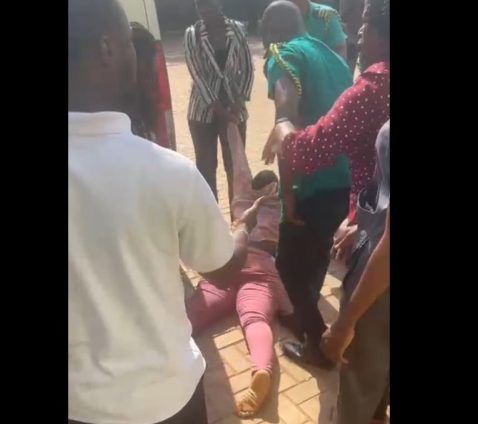A tense confrontation erupted on Tuesday, November 11, 2025, at the VICSEM Hotel in Ogbojo, Accra, when officers from the Ghana Immigration Service (GIS) attempted to forcibly remove a group of deportees recently repatriated from the United States.
Eyewitnesses described the scene as chaotic and distressing, with confusion spreading among the deportees as officials tried to relocate them from the facility where they had been temporarily housed upon arrival.
Viral videos circulating online showed an immigration officer dragging a woman across the floor into a waiting vehicle, sparking widespread outrage on social media.
The reason behind the forced removal remains unclear, though it is believed that the officers were acting on orders to transfer the deportees to another location.
The individuals are part of a U.S.-Ghana repatriation arrangement established under former U.S. President Donald Trump’s administration, which allows Ghana to receive its citizens deported from the United States.
Government sources have defended the agreement, explaining that it operates under a Memorandum of Understanding (MoU) rather than a formal treaty, and therefore does not require parliamentary approval.
Officials insist that the arrangement is grounded in humanitarian principles, highlighting Ghana’s responsibility to reintegrate its nationals who face difficult conditions abroad.
However, the policy has come under renewed scrutiny from the Minority in Parliament, which has repeatedly accused the government of sidestepping constitutional processes.
Public backlash intensified following the recent repatriation of 14 Ghanaian deportees, with opposition MPs demanding greater transparency on the terms of the agreement.
The controversy deepened after the Minister of Foreign Affairs, Samuel Okudzeto Ablakwa, revealed that Ghana would soon receive an additional 40 West African deportees under the same arrangement.
Meanwhile, human rights lawyer Oliver Barker-Vormawor, who represents some of the affected individuals, has accused the government of endangering lives by facilitating the return of asylum seekers to countries where they could face persecution.
In a statement, Barker-Vormawor argued that the U.S. government had previously granted these individuals protection status due to “a genuine fear of persecution,” and therefore could not lawfully deport them to their countries of origin.
“By accepting them, Ghana is effectively serving as an intermediary in their deportation process,” he cautioned, adding that the move could expose Ghana to international criticism for violating human rights obligations.
The Ghana Immigration Service has yet to issue an official statement regarding the incident at the VICSEM Hotel or the broader concerns surrounding the deportation policy.
ALSO READ:



